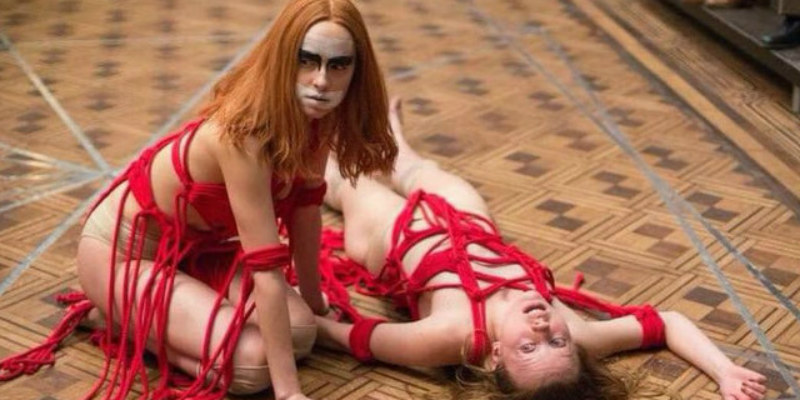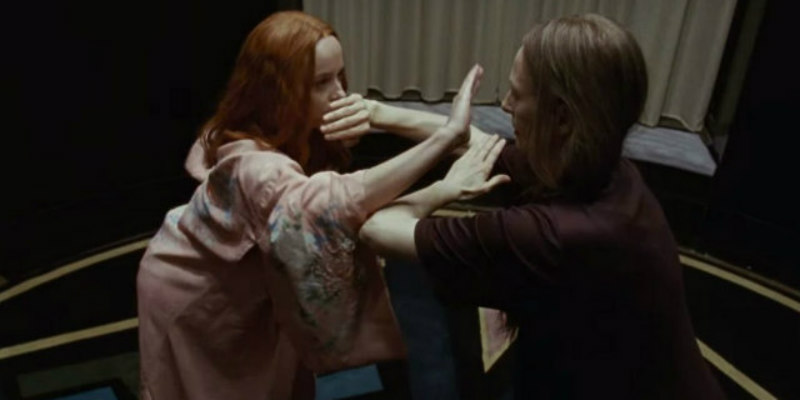
Review by Eric Hillis
Directed by: Luca Guadagnino
Starring: Dakota Johnson, Tilda Swinton, Mia Goth, Chloë Grace Moretz, Jessica Harper

At this point it seems like every classic and not so classic horror movie has been given the remake treatment. Well, the Anglo-Saxon ones at least. Italy's horror legacy has largely been left alone, chiefly because its very latin-blooded aesthetic doesn't translate easily to the sort of four quadrant market Hollywood bean-counters pursue. For a long time it felt like Dario Argento's Suspiria, the high point of Italian horror cinema, would escape being remade, rebooted or reimagined, but before switching allegiance to the Halloween franchise, David Gordon Green was heavily linked with reinterpreting Argento's film for a modern audience. Green's down to earth indie filmmaking couldn't be further from the dreamlike, operatic stylings of Argento, so it always seemed an odd fit.
When the rights averted to Luca Guadagnino (A Bigger Splash; Call Me by Your Name), it seemed a more sensible fit. Guadagnino is an Italian who fell in love with Argento's film as a young boy, and prior to the relatively subdued Call Me by Your Name, he was known for his love of cinematic melodrama.

It's surprising then to find Guadagnino's Suspiria so disparate in tone from Argento's original, and from Italian cinema in general. If you weren't aware of its director, you might assume it the product of someone more native to its Central European setting. If Argento's primary coloured nightmare was a stained glass window shattered and reassembled by a madman, Guadagnino plasters over the window and decorates it with a bible quote - it's a very Protestant remake of a very Catholic movie, one which seeks to replace emotion with intellect. I hate to use the P word but it's pretentious as hell, and I'm not sure it succeeds in its goal of setting your mind, rather than your heart racing, but it's never not watchable.
[ READ MORE: New To DVD - X-Men: Dark Phoenix ]
Guadagnino keeps the setting of 1977 Germany, but moves the action from Freiburg to Berlin, for no real reason other than to shoehorn in a background subplot regarding the political terrorism of the era, or maybe just as a nod to Andrej Zulawski's Possession, a film it has a lot more in common with visually than Argento's Suspiria. As with the original, it opens with a young student of the Markos Dance Academy fleeing in distress. Here it's Patricia (Chloë Grace Moretz), a patient of aging psychiatrist Jozef Klemperer (Tilda Swinton in heavy make-up) who claims that the women who run the academy are out to get her.
With Patricia subsequently disappearing, rumoured to have joined up with a terrorist group, her place is quickly taken by Susie Bannon (Dakota Johnson sporting a shock of red hair like Moira Shearer in The Red Shoes; not a coincidence I suspect), a young American girl from a Mennonite community with a constant deer in the headlights expression on her wide-eyed face.

Where Guadagnino's film strays most from Argento's is in unveiling the truth about the Markos academy off the bat, and making Susie more than just a nosy American who decides to poke around behind the curtains of the institution. Upon her arrival, the matriarchs of the academy, led by Madame Blanc (Swinton again), begin talking about Susie as some sort of chosen one, and as Susie quickly ascends through the ranks of her troupe, we get the feeling she's by no means as innocent as she appears.
[ READ MORE: New To DVD - Our Time ]
This is an interesting reworking of the original's central premise, and I appreciate Guadagnino's refusal to simply fawn over a beloved classic, but along with screenwriter David Kajganich, he pads his film out with unnecessary subplots that seem like cynical attempts to place Suspiria into that category of genre cinema that's become known by the eye-rolling label of 'elevated horror'. Along with the constant reminders of terrorism that play on TV screens and radios, we spend a lot of time with Klemperer as he conducts an investigation into the disappearance of his wife (played by the original Susie Bannion, Jessica Harper) during WWII. There's something a little distasteful about how the movie draws on the memory of the Holocaust to cheaply add an extra layer of unease and foreboding.

I'm no theologian, but Guadagnino's witches seem to have appropriated elements of Jewish culture. The academy's central ballet sees dancers clad in what appears to be red Kabbalah strings; the witches use thin metal hooks on their victims like kosher butchers; and committing suicide during an attack of conscience, a witch raises her head to heaven and slits her throat. I'm not sure what Guadagnino is implying with such imagery, but it made me think about how Argento used Verdi's 'Nabucco', an opera concerning the exile of the Jews from their homeland, to score his 1980 Suspiria sequel Inferno.
While Guadagnino's film trades the lurid spectacle of Argento for an earthen ambiguity, that's not to say his film doesn't boast its own visual delights. The climactic ballet is rendered in dazzling fashion, Guadagnino and editor Walter Fasano slicing and dicing it to create the sensation, much as Michael Powell did with The Red Shoes, to place you in the shoes of the dancers rather than the seats of the auditorium. It's the film's highlight, but coming at a time when the excessive running length is beginning to take its toll, it makes you wish Guadagnino had spent more time using his film to create emotions and sensations rather than getting distracted with period detail and political chin-stroking that ultimately adds very little to this reimagining of one of the few movies that have genuinely managed to capture the feeling of a nightmare.

Suspiria comes to UK DVD October 7th.
"Offers plenty of eye candy, but not nearly as much food for thought as this subject warrants."— 𝕋𝕙𝕖𝕄𝕠𝕧𝕚𝕖𝕎𝕒𝕗𝕗𝕝𝕖𝕣.𝕔𝕠𝕞 🎬 (@themoviewaffler) October 2, 2019
ZOMBI CHILD plays at the London Film Festival October 6th, 7th and 11th.
Read @hilliseric's reviewhttps://t.co/hnywxLTqot pic.twitter.com/1W4xrszpUP

